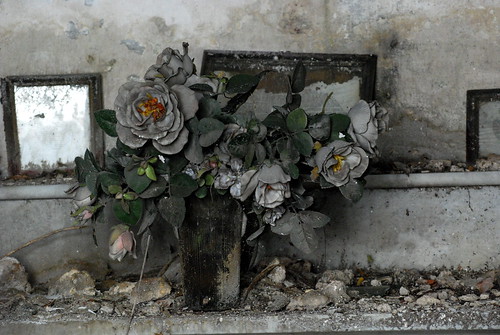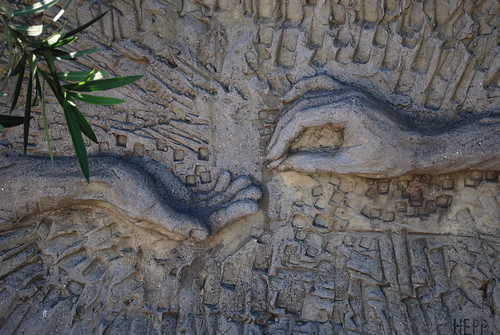OLDaily
by Stephen Downes
April 30, 2010
Buenos Aires, Argentina

I am in Buenos Aires and have uploaded some photos, including a number of remarkable shots from the Mausoleum.
Stephen Downes,
Flickr,
April 30, 2010 [Link] [Tags: Flickr]
[Comment] [Tweet]
Why Don't I Release DIY U As A Free Download?
Thje question had to be asked, I guess: why wasn't the Edupunk book released as a free download? Author Anya Kamenetz responds, "I am a professional writer and journalist, not an academic or a performer, and it's important to me therefore that I be paid specifically for my writing and reporting." Well, leaving aside the fact that this response is a tautology, I would respond there are other ways to be paid. Kamenetz anticipates the objection. Writing a book, she says, is better than writing in a magazine where "the advertisers have a whisper of influence" and better than speaking engagements where "I am collecting revenue directly from organizations that have particular agendas."
But this requires us to somehow swallow the idea of the purity of the book, which, frankly, is a load of hogwash. It's beyond credibility to thing that publishers don't have influence over what's publish. There's a lot I like about Kamenetz's book (which I'm reading now, having bought it before the unexpected free copy arrived (so now I have two)) but it also represents the commodification of the idea of edupunk. That's what publishers do. They capture ideas, and own them, later reframing them to suit their own purpose.
As a final refutation of her answer: does she feel her views on edupunk are somehow less tainted by commercial interests than, say, mine? Or Jim Groom's? Because she got paid to write about edupunk and we didn't? Of course not. Groom and I are just as much writers and journalists as she is (well, at least I am; I'll let Groom speak for himself). Being published isn't what makes you a journalist. It's what makes you a paid journalism, and in a world where everyone is a journalist, you are not being paid for your journalism. Which kind of begs the question, then, doesn't it: why, actually, did Kamenetz get paid? (Hint)
Anya Kamenetz,
DIYU,
April 30, 2010 [Link] [Tags: Edupunk, Books, Marketing, Academia]
[Comment] [Tweet]
The coming melt-down in higher education (as seen by a marketer)
Seth Godin is a marketer, not an educator, but as a marketer he predicts the downfall of higher ed. "I'm afraid," he writes, "that's about to crash and burn. Here's how I'm looking at it... Just as we're watching the disintegration of old-school marketers with mass market products, I think we're about to see significant cracks in old-school schools with mass market degrees... Accreditation isn't the solution, it's the problem." Via Daniel Lemire.
Seth Godin,
Seth's Blog,
April 30, 2010 [Link] [Tags: Schools]
[Comment] [Tweet]
Struggling with the costs of teaching in higher education
"I can't find any bloody research on the costs of e-learning," writes Tony Bates. "So you can imagine my delight when Volume 38, Number 3 of ‘Planning for Higher Education‘, devoted almost entirely to Issues in Higher Education Finance' arrived in the mail." The rest of this useful (very useful) post is a summary of that issue (which I was able to freely access). Some interesting findings: "The cost of teaching in universities is NOT going up much faster than inflation (at least in the USA)." And "By reducing state funding and increasing tuition fees in the public sector, the higher education system in the USA is clearly moving from funding higher education as a public good to that of a private good." Which is not a good idea, IMO.
Tony Bates,
e-learning & distance education resources,
April 30, 2010 [Link] [Tags: Online Learning, Research, Tuition and Student Fees]
[Comment] [Tweet]
Presence
Quite a good post on the Plearn Blog on Presence. Rita Kop looks at six kinds of presence and then outlines Garrison, Anderson and Archer's account of the role of presence in education. And then she relates it to personal learning environments. 'So the higher the level of presence, the higher the level of involvement in the online activity and the deeper the experience. The question of how to create presence in the design of a PLE is an important one as at the heart of PLE-based learning would be a high level of engagement and depth of learning."
Rita Kop,
Plearn Blog,
April 30, 2010 [Link] [Tags: Experience]
[Comment] [Tweet]
Cook Report on Building a National Knowledge Infrastructure
This report points to the direction the internet could (and should) take, based on the Dutch internet. "Unlike the United States - where private interests have walled off and Balkanized much of the Internet - the Dutch are committed to collaboration both inside and outside the country. They have been a proactive force for international collaboration with scientists and network specialists in the EU, the United States and elsewhere with their Global Lambda Integrated Facility or GLIF [in other words - user-controlled lightpaths - SD]. And the more you learn, the more it is apparent that the Netherlands is building the electronic network and knowledge infrastructure on which the economy of the 21st century will be based."
Bill St. Arnaud,
Weblog,
April 30, 2010 [Link] [Tags: United States, Networks]
[Comment] [Tweet]
Technology to Enhance Learning in 2015?
Derek Morrison offers an long and well-considered look at what we can offer students in 2015. I'm not sure I agree with his method of using Google analytics to show that the ebook is becoming more important the LMS. Though there seems no doubt we'll be flooded with them by 2015, while at the same time there will be yet another crackdown on student file sharing. Morrison also discusses online games, and while I'm sure we'll see many more in the style of urgent Evoke I don't think students will want to be led around by some taskmaster, and I don't think learning games will consist of periodic projects or quests that everyone must complete in unison. But designers won't have learned that by 2015 either. So, while I think Morrison is probably on target, I fear he is picking trends that, while they may describe 2015, will be on the wane by 2016.
Derek Morrison,
The Auricle,
April 30, 2010 [Link] [Tags: File Sharing, Books, Google, Project Based Learning]
[Comment] [Tweet]
Cordoba

Photos from Cordoba, Argentina. Newsletters this week and next will be subject to bandwidth (and time). In the meantime, enjoy this photo set from Cordoba (as always, the slideshow is the best way to view them).
Stephen Downes,
Flickr,
April 29, 2010 [Link] [Tags: Bandwidth, Flickr]
[Comment] [Tweet]
Desire2Learn Raises the Bar with Release of Learning Suite 9.0
Very many people worked on this, of course, but it has also been a big part of my work recently. "The new Desire2Learn Instructional Design Wizard and Desire2Learn Course Builder are complementary to the existing content management tools, and are the result of substantial investment and years of intensive R&D involving clients, strategic research partners, including National Research Council of Canada (NRC) and Université de Moncton, along with many members of the Desire2Learn R&D group. For more information about this research partnership, please see www.synergic3.com.
Anouncement,
Desire2Learn,
April 29, 2010 [Link] [Tags: Desire2Learn, Content Management Systems, Canada, Research]
[Comment] [Tweet]
This newsletter is sent only at the request of subscribers. If you would like to unsubscribe,
Click here.
Know a friend who might enjoy this newsletter? Feel free to forward OLDaily to your colleagues. If you received this issue from a friend and would like a free subscription of your own,
you can join our mailing list. Click here to subscribe.
Copyright 2008 Stephen Downes
Contact: stephen@downes.ca
This work is licensed under a
Creative Commons License.